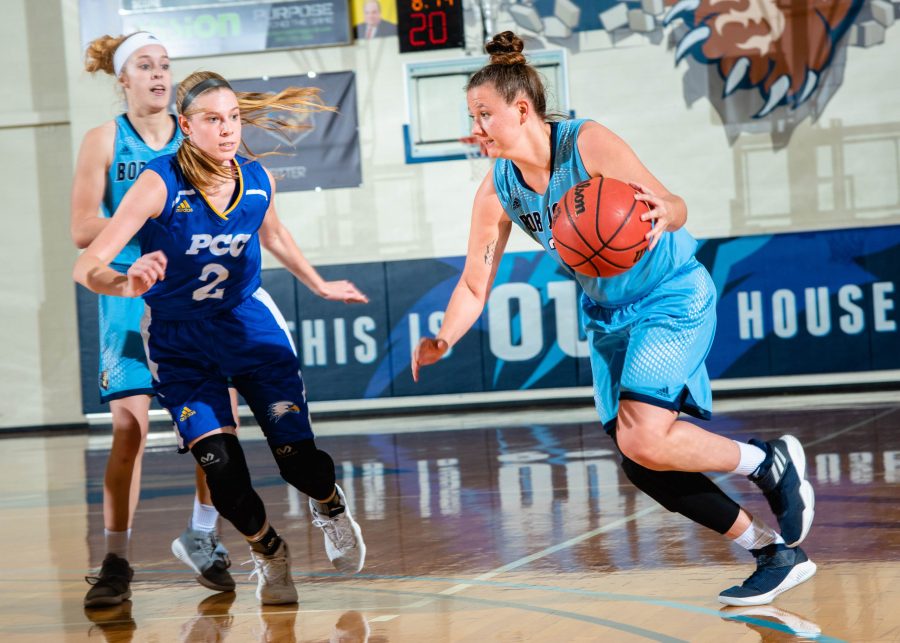Ever since BJU senior Madison Shupe began playing basketball when she was 4 years old, she dreamed of playing professionally.
“If you had asked me what I wanted to be when I grew up, it would’ve been a WNBA star,” Shupe said.
As a kid, sports were what she lived and breathed—basketball, volleyball and softball. She played year-round, both for her high school and for travel teams, often participating in multiple sports in the same season.
Her entire life revolved around athletics. “I didn’t watch TV; I didn’t play video games—I was always outside, doing something sports related,” Shupe said.
Little did she know that she was about to receive news that would completely derail her dream of playing pro basketball.
In her junior year of high school, Shupe began to have health problems, often waking up feeling very dizzy. Her mom took her to an ENT doctor, assuming the recurrent health problems were related to allergies.
After checking her out, the ENT told Shupe that she had vertigo. She originally thought it was something hereditary, because her grandma and a few other relatives have suffered vertigo. However, the doctor told her that he wanted to run some additional tests just to be sure of the diagnosis.
On April 19, 2014, her 17th birthday, Shupe had a CT scan. The results were serious—a cyst in her brain along with a possible mass. After an MRI, the doctor came back to her with even worse news—she had a brain tumor and needed to be operated on immediately.
After seeing a specialist, Shupe had brain surgery on May 15, 2014, only a few weeks after the doctors discovered the tumor. Although the surgery was successful, a few nerves were damaged during the procedure, leaving her entire left leg without feeling.
Because of the numbness in her left leg, Shupe had to overcompensate with her right leg.
Eventually the arch of her left foot completely collapsed, leaving her with so much muscle loss that she could not even stand on the tiptoes on her left foot. She also developed arthritis in her hip from lying down after surgery.
During the entire three-month recovery process, Shupe wondered if she would ever be able to play sports again.
“How can I play sports if I can’t even jump or run?” Shupe asked herself. “Before surgery, I could hit the backboard doing a layup, and now I can’t even get off the ground.”
For the next several months, Shupe went through intense rehab and physical therapy in order to regain as much muscle as she could. Because of her athleticism before surgery, she completed recovery much faster than most people would.
Shupe wanted to quit sports, even telling her parents that she was not going to play her senior year of basketball. However, her parents would not let her give up.
“My parents always raised me to finish what I started, to not be a quitter,” Shupe said. “They pushed me hard because they wanted to see me get back to the old me.”
A few months after surgery, in August of 2014, Shupe was back on the court, playing for State Line Rush, a basketball program in North Carolina. “Obviously I couldn’t run really fast, but I was playing,” Shupe said.
In her senior season, Shupe’s team came to Bob Jones University to play in the annual high school tournament. Her team won the tournament, and Mike LeViere, the coach of the Bruins women’s basketball team began talking to one of Shupe’s teammates, Rachel Clark, about playing for the Bruins.
Before surgery, Shupe had played for an elite AAU team, receiving letters from the coaches of several DI schools. After surgery, she began doubting if she would even play basketball in college. “I’ll just finish out my senior year and enjoy it while I’m playing,” Shupe told her parents. But her parents convinced her not to give up on her dreams, and after a few conversations with Coach LeViere throughout the season, she signed for the Bruins and began playing in the spring of 2017.
Today, Shupe continues to struggle a little bit with the aftermath of her brain surgery. Her left leg still does not have much feeling in it, but she continues to build up the speed and strength she lost during surgery and recovery.
“My freshman year, I was probably the slowest player on the team, but since then I’ve regained a lot of speed,” Shupe said. “In addition, I feel like I play smarter now than I did when I was in high school.” Looking back on brain surgery and the recovery process, Shupe said the entire ordeal has humbled her.
“In high school I was focused on being the top athlete, not on glorifying God,” she said. “Now I see that my ability is a talent that God gave me.” Shupe is a senior sports management major and plans to graduate in May. After graduation, she would like to coach younger kids.
“Coaches impact kids’ lives,” she said. “I want to give back to the kids what God gave me.” Shupe’s experience with brain surgery has given her a different outlook on life. “Surgery definitely changed me,” she said. “I look at life in a different perspective.”

























































